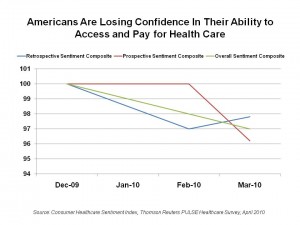Americans’ faith in their ability to obtain and pay for health care has eroded in 2010. Notwithstanding the fact that a health reform bill has passed and the nation’s macroeconomic measures appear to be picking up, people in the U.S. are losing confidence in their ability to access and pay for health care.
The chart illustrates the downward trend in Americans’ perceived ability to access and pay for health care both in the past 3 months and in the next 3 months.
Thomson Reuters bases the Consumer Healthcare Sentiment Index on looks back 3 months and ahead for 3 months. In March 2010, an increasing number of people told Thomson Reuters they lost or reduced their health insurance coverage in the previous 3 months, and more Americans expect to delay or cancel surgeries, diagnostic tests, visits to doctors, and therapy in the coming 3 months.
The index aggregates two measures: a retrospective metric which asks about peoples’ health experiences in the past three months; and a prospective measure which gauges health citizens’ expectations for three months ahead.
The questions behind the Retrospective index are whether someone has:
- Postponed, delayed, or cancelled health care
- Delayed or failed to fill a prescription
- Had difficulty paying for health insurance or health services
- Cancelled or reduced health insurance coverage.
For the Prospective index, looking ahead 3 months, Thomson asked whether someone expects to:
- Have difficulty paying for health insurance or services
- Delay or cancel a doctor visit
- Delay or cancel a diagnostic test
- Delay or cancel therapy
- Delay or cancel elective surgery
- Delay or fail to fill a prescription
- Cancel or reduce health insurance coverage.
Thomson Reuters has been tracking health sentiment from the beginning of the recession in 2008. Data revealed that as the recession progressed, Americans’ ability to access and pay for health care worsened. The company is using the PULSE Healthcare Survey data to build the index. Thomson Reuters will continue to report this index on a monthly basis.
Health Populi’s Hot Points: This research builds on a question in the Kaiser Family Foundation’s Health Tracking Poll from September 2009 which found that 56% of people in the U.S. have done something to self-ration health care due to costs.
Third party payers should be forewarned: health citizens’ short-term fiscal “discipline” for cutting personal health spending by delaying various aspects of care will have negative physical consequences. By delaying diagnoses, care when sick, and prescription fills, people will get sicker and need more aggressive — read costly — treatment. This is a recipe for increasing the health cost curve, and not bending it back.
Payers and plan sponsors need to design health plans based on total value and whole health. This means front-ending spending on primary care and prioritizing a medical home for every health citizen. The double-edge sword of “incentivizing” health consumers by allocating more costs to them can cut the wrong way when a health plan has the unintended consequence of motivating people to delay care.





 Interviewed live on BNN Bloomberg (Canada) on the market for GLP-1 drugs for weight loss and their impact on both the health care system and consumer goods and services -- notably, food, nutrition, retail health, gyms, and other sectors.
Interviewed live on BNN Bloomberg (Canada) on the market for GLP-1 drugs for weight loss and their impact on both the health care system and consumer goods and services -- notably, food, nutrition, retail health, gyms, and other sectors. Thank you, Feedspot, for
Thank you, Feedspot, for  As you may know, I have been splitting work- and living-time between the U.S. and the E.U., most recently living in and working from Brussels. In the month of September 2024, I'll be splitting time between London and other parts of the U.K., and Italy where I'll be working with clients on consumer health, self-care and home care focused on food-as-medicine, digital health, business and scenario planning for the future...
As you may know, I have been splitting work- and living-time between the U.S. and the E.U., most recently living in and working from Brussels. In the month of September 2024, I'll be splitting time between London and other parts of the U.K., and Italy where I'll be working with clients on consumer health, self-care and home care focused on food-as-medicine, digital health, business and scenario planning for the future...